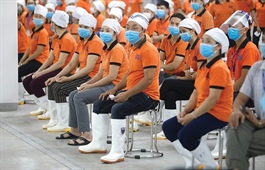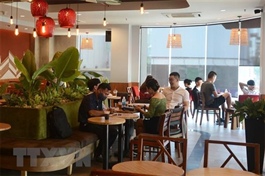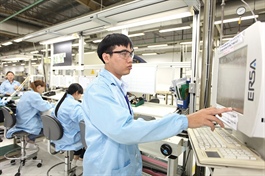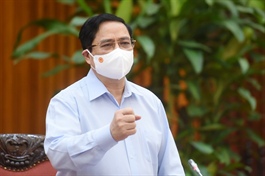New NA deputies prepare to lay new foundations for socioeconomic development
New NA deputies prepare to lay new foundations for socioeconomic development
Vietnam’s new National Assembly (NA) will convene its first session in July, with the official list of newly-elected deputies to be announced soon so they can prepare to undertake a five-year term with the heavy responsibility of driving the economy forward.
According to the National Assembly Office, the first session of the new NA is scheduled to be organised between July 20 and August 3. The session will take six days to consider personnel work and four days for other important issues such as reports on socioeconomic development and state budget in the first half of 2021 and solutions for the second half of the year.
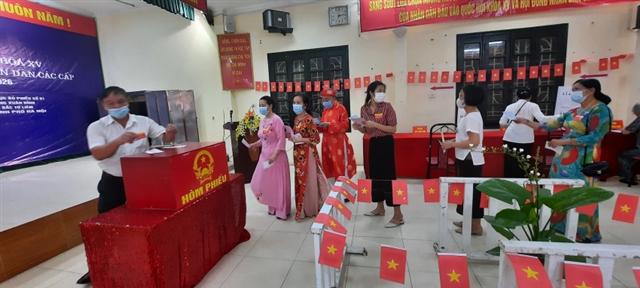
The new NA deputies will be announced next month before the first congress
|
The new deputies will also debate and adopt resolutions on formulating laws and ordinances and a supervision programme for 2022, the country’s middle-term public investment plan for 2021-2025, as well as the national planning on land use for the rest of the decade.
The official list of the newly-elected NA deputies is expected to be announced on June 12. All deputies will receive a certificate stating that they are qualified to become NA deputies.
Last week, nearly 70 million voters went to polling stations across the country to elect deputies to the 15th NA and people’s councils of all levels for 2021-2026. Nearly 100 per cent of voters performed their legal rights and obligations, demonstrating increasing interest in the NA and its relevance to people’s lives. As many as 500 NA deputies and about 264,000 deputies of people’s councils have been elected.
Minister of Home Affairs Pham Thi Thanh Tra said, “The elections have been a resounding success of democracy, equality, and safety ensured under the law. Despite difficulties caused by COVID-19, many people who are in isolation or are undergoing medical treatment could still vote, enjoying their full civic rights and responsibilities.”
According to Party General Secretary Nguyen Phu Trong, the elections are especially important as they will help the country implement its new Socioeconomic Development Plan for 2021-2025 and the Socioeconomic Development Strategy for 2021-2030, and especially the resolution of the 13th National Party Congress organised in February – all aimed to build a socialist, law-governed state of the people, by the people, and for the people.
“I do believe that with these extremely significant elections, our country will embark on a new period of development with a brighter outlook that can meet the requirements and aspirations of all constituents and people nationwide,” the Party chief stressed after casting his vote in Hanoi.
“I hope that all deputies of the 15th NA and people’s councils of all levels will devote their heart to the nation and its people, and fulfil all of their responsibilities under the constitution and the law. They are acting on behalf of the people in managing the country and society,” he continued. “As deputies representing the people, they have to continuously train themselves and enhance their ethics, skills, and knowledge, while keeping an open ear to the ideas and feedback of the public, and accomplish the tasks assigned to them by the constituents and people.”
Vuong Dinh Hue, Chairman of the NA and chairman of the National Election Council, also committed that in the 15th NA and under the light of the resolution of the 13th National Party Congress, “The legislative body will continue renewing itself to further improve the quality of law-making for all sectors and areas, deciding on important national issues and performing supreme supervision activities.”
Commenting on the great significance of the elections, Caitlin Wiesen, resident representative in Vietnam of the United Nations Development Programme, said that the general elections are an important opportunity for people to implement their right to choose their representatives.
“Political participation is clearly rooted in the United Nations Universal Declaration of Human Rights and the International Covenant on Civil and Political Rights, which highlights the right of every person to equal participation in public affairs, the right to vote, and the right to be elected,” Wiesen said.
She referred back to the first general election back in 1946, where President Ho Chi Minh also clearly stated, “General elections constitute an opportunity for the entire population to freely elect people with talent and good virtues to shoulder national affairs. Anyone with an interest in national affairs can stand for the elections and each citizen is entitled to go to the polls. All citizens, regardless of their gender, economic situation, religion, race, social class, or political party, have these two rights.”
These principles are still as important and relevant as ever, Wiesen added. “Women, men, persons who identify themselves of non-binary gender, and persons with disabilities bring their unique experiences and perspectives into the decision-making process. No-one else can understand and raise issues that impact them better than themselves,” she said.








